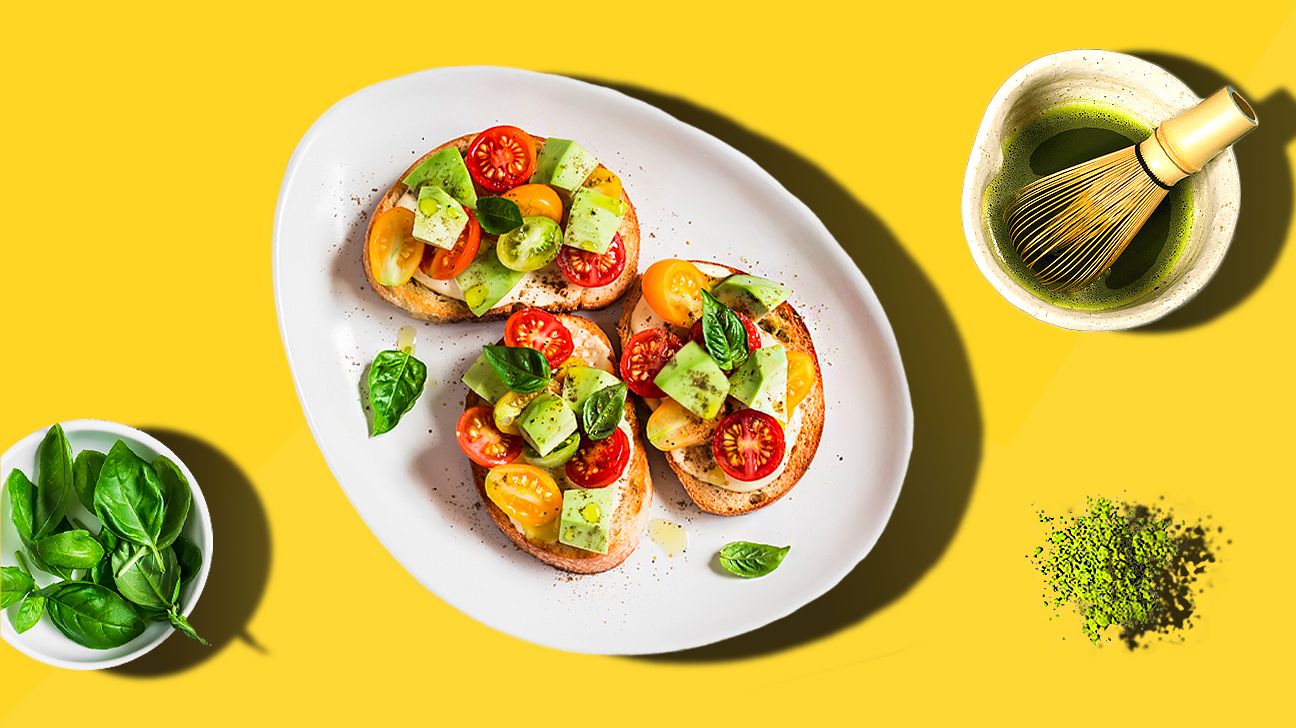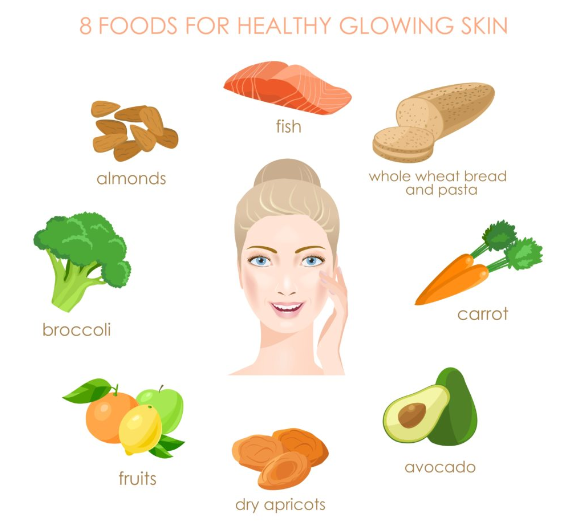What to Eat Daily for Healthy Skin? To maintain healthy skin, consume a balanced diet rich in fruits, vegetables, lean proteins, and healthy fats. Hydrate adequately and avoid processed foods.
Healthy skin reflects overall well-being and requires proper nutrition. Consuming a variety of colorful fruits and vegetables ensures an intake of essential vitamins and antioxidants. Lean proteins like fish, chicken, and legumes support skin repair and growth. Healthy fats from sources like avocados, nuts, and olive oil help maintain skin elasticity.
Drinking plenty of water keeps the skin hydrated and flushes out toxins. Avoiding processed foods, high in sugar and unhealthy fats, prevents inflammation and skin issues. By prioritizing these dietary choices, you can achieve and maintain glowing, healthy skin.

Credit: www.pinterest.com
Introduction To Skin Health And Diet
What to Eat Daily for Healthy Skin? Healthy skin starts with a healthy diet. What you eat impacts your skin. The right foods can give you a glowing complexion. Learn how nutrition affects your skin health. Discover the key nutrients for radiant skin.
The Impact Of Nutrition On Skin
Nutrition plays a vital role in skin health. Nutrients help skin repair and renew. A balanced diet keeps skin hydrated. Some foods can cause breakouts or dullness.
Eating the right foods helps maintain skin elasticity. It also protects against sun damage. A nutrient-rich diet supports collagen production. This keeps skin firm and youthful.
Key Nutrients For A Radiant Complexion
What to Eat Daily for Healthy Skin? Certain nutrients are essential for glowing skin. Vitamins, minerals, and antioxidants are key. Below is a table of important nutrients and their sources.
| Nutrient | Benefits | Food Sources |
|---|---|---|
| Vitamin C | Boosts collagen production | Oranges, strawberries, bell peppers |
| Vitamin E | Protects against sun damage | Almonds, sunflower seeds, avocados |
| Omega-3 Fatty Acids | Reduces inflammation | Salmon, flaxseeds, walnuts |
| Antioxidants | Fights free radicals | Blueberries, dark chocolate, green tea |
| Water | Keeps skin hydrated | Watermelon, cucumbers, plain water |
Fatty Fish: Omega-3 Rich Foods
For glowing, healthy skin, fatty fish is a top choice. These fish are rich in omega-3 fatty acids. Omega-3s help maintain skin health and hydration. They also reduce inflammation, which can cause acne and redness.
Benefits For Skin Hydration
Omega-3 fatty acids in fatty fish keep your skin hydrated. They form a barrier that locks in moisture. This barrier also protects your skin from harmful pollutants. Omega-3s help reduce dry, flaky skin. Regular consumption can make your skin look supple and soft.
Best Sources Of Omega-3
There are many types of fatty fish rich in omega-3. Here are some of the best sources:
- Salmon: A popular fish, rich in omega-3s and protein.
- Mackerel: Contains high levels of omega-3 and vitamin D.
- Sardines: Small but packed with omega-3, calcium, and vitamin B12.
- Tuna: Great source of omega-3, especially in fresh or canned light tuna.
- Herring: Often consumed smoked, it is rich in omega-3 and vitamin E.
Incorporate these fish into your diet for healthy skin. Aim to eat fatty fish twice a week for the best results.
| Fish Type | Omega-3 Content (per 100g) | Additional Benefits |
|---|---|---|
| Salmon | 1.5g | High in protein and vitamin B. |
| Mackerel | 2.6g | Rich in vitamin D. |
| Sardines | 1.4g | High in calcium and vitamin B12. |
| Tuna | 1.2g | Contains protein and selenium. |
| Herring | 1.7g | High in vitamin E and protein. |
Avocados: Healthy Fats And Vitamins
What to Eat Daily for Healthy Skin? Avocados are a powerhouse for healthy skin. They contain healthy fats and vitamins. These nutrients keep your skin glowing and youthful. Avocados are rich in vitamins C, E, and K. They provide essential fatty acids that promote skin health.
Skin Protection Properties
Avocados offer amazing skin protection properties. The antioxidants in avocados fight free radicals. This reduces signs of aging and skin damage. The vitamins in avocados boost collagen production. Collagen keeps your skin firm and smooth. The healthy fats in avocados moisturize your skin from within.
Integrating Avocados Into Your Diet
Adding avocados to your diet is easy and delicious. Here are a few ways:
- Breakfast: Add sliced avocados to your toast or smoothie.
- Lunch: Include avocados in your salads or sandwiches.
- Dinner: Use avocados as a topping for tacos or bowls.
- Snacks: Enjoy guacamole with whole-grain chips.
Here’s a simple table to show how avocados can be included in your daily meals:
| Meal | How to Include Avocados |
|---|---|
| Breakfast | Sliced on toast or blended in smoothies |
| Lunch | Added to salads or sandwiches |
| Dinner | Used as a topping for tacos or bowls |
| Snacks | Guacamole with whole-grain chips |
Integrate avocados into your meals for healthy, glowing skin. The healthy fats and vitamins in avocados make a big difference. Enjoy the benefits of avocados every day.
Nuts And Seeds: Antioxidant Powerhouses
Nuts and seeds are small but mighty. They are packed with antioxidants. These antioxidants help fight skin-damaging free radicals. Including them in your diet can lead to healthier skin. Their high vitamin and mineral content nourish your skin from within.
Types Beneficial For Skin Health
- Almonds: Rich in vitamin E, which protects skin cells from damage.
- Walnuts: Contain omega-3 fatty acids that reduce inflammation and keep the skin moist.
- Pumpkin Seeds: High in zinc, which helps in skin repair and renewal.
- Chia Seeds: Packed with antioxidants and omega-3s that hydrate and plump the skin.
- Flaxseeds: Contain lignans and fatty acids that improve skin texture and hydration.
- Sunflower Seeds: Loaded with vitamin E and selenium, promoting skin elasticity.
Daily Recommended Intake
| Nut/Seed | Daily Intake |
|---|---|
| Almonds | 1 ounce (about 23 almonds) |
| Walnuts | 1 ounce (about 14 halves) |
| Pumpkin Seeds | 1 ounce (about 85 seeds) |
| Chia Seeds | 1 tablespoon |
| Flaxseeds | 1 tablespoon |
| Sunflower Seeds | 1 ounce (about 1/4 cup) |
Eating a variety of nuts and seeds ensures a range of nutrients. These small additions to your diet can make a big difference in skin health.
Brightly Colored Vegetables: Vitamins And Minerals
Brightly colored vegetables are packed with essential vitamins and minerals. They can help you achieve radiant, healthy skin. These vegetables are rich in antioxidants, which protect your skin from damage. They also contain vitamins that support skin health. Including these vegetables in your daily diet can improve your skin’s appearance.
Carotenoids And Skin Appearance
Carotenoids are pigments found in brightly colored vegetables. They give these vegetables their vibrant colors. Carotenoids, like beta-carotene, are important for skin health. They can improve your skin’s color and glow. Eating foods rich in carotenoids can make your skin look healthier.
| Vegetable | Carotenoid Content |
|---|---|
| Carrots | High in beta-carotene |
| Sweet Potatoes | Rich in beta-carotene |
| Spinach | Contains lutein |
| Tomatoes | High in lycopene |
Vegetables To Include In Your Diet
To support healthy skin, add these vegetables to your meals:
- Carrots: High in beta-carotene, great for skin health.
- Sweet Potatoes: Packed with beta-carotene, good for a glowing complexion.
- Spinach: Contains lutein, which helps protect your skin.
- Tomatoes: Rich in lycopene, which can improve skin texture.
- Bell Peppers: High in vitamins A and C, beneficial for skin repair.
- Broccoli: Contains vitamins and minerals that promote skin health.
Eating these vegetables daily can enhance your skin’s health and appearance. They provide essential nutrients that support skin repair and protection. Including a variety of these vegetables ensures you get a range of benefits.
Berries: The Antioxidant Berries
Are you searching for foods that can give you healthy, glowing skin? Look no further than berries. These small, delicious fruits are packed with antioxidants. Antioxidants help fight off harmful free radicals in your body. This makes berries essential for maintaining youthful, radiant skin.
Skin Healing Benefits
Berries are rich in vitamins and minerals. These nutrients support skin health. They help in repairing damaged skin cells. Berries also boost collagen production. Collagen keeps your skin firm and elastic. Regular consumption of berries can reduce signs of aging. They can also help fight acne and inflammation.
Which Berries To Eat For Glowing Skin
- Blueberries: These are high in vitamins A and C. They help in reducing acne and scars.
- Strawberries: Rich in vitamin C, they brighten your skin and improve texture.
- Raspberries: Contain antioxidants that fight free radicals. They also have anti-inflammatory properties.
- Blackberries: Packed with vitamins A, C, and K. They help in skin regeneration and repair.
- Goji Berries: These are full of beta-carotene. They improve skin tone and reduce sun damage.
| Berry | Main Benefit | Key Nutrients |
|---|---|---|
| Blueberries | Reduces acne and scars | Vitamins A and C |
| Strawberries | Brightens skin | Vitamin C |
| Raspberries | Anti-inflammatory | Antioxidants |
| Blackberries | Skin regeneration | Vitamins A, C, and K |
| Goji Berries | Improves skin tone | Beta-carotene |
Green Tea: The Skin Super Drink
Green tea is a powerful drink that offers many health benefits. One of its standout benefits is its ability to improve skin health. This super drink is packed with antioxidants and nutrients that help your skin look its best.
Catechins And Their Skin Benefits
Green tea is rich in catechins, a type of antioxidant. These catechins help fight free radicals in your body. Free radicals can damage your skin cells. By fighting free radicals, catechins help keep your skin healthy and youthful.
Another benefit of catechins is their anti-inflammatory properties. They can reduce redness and swelling in your skin. This makes green tea a great choice for people with sensitive skin.
Green tea also helps protect your skin from sun damage. The catechins in green tea can reduce the harmful effects of UV rays. This can help prevent sunburn and long-term damage.
How Much Green Tea To Drink
To get the skin benefits of green tea, you need to drink the right amount. Experts suggest drinking 2 to 3 cups of green tea a day. This amount provides enough catechins to benefit your skin.
Drinking too much green tea can have side effects. Stick to the recommended amount to avoid these issues. You can enjoy green tea hot or cold. Adding a slice of lemon can enhance the flavor and benefits.
Remember to choose high-quality green tea for the best results. Organic green tea is a good option. It is free from pesticides and other harmful chemicals.
| Benefit | Description |
|---|---|
| Antioxidants | Fight free radicals to protect skin cells. |
| Anti-inflammatory | Reduce redness and swelling. |
| Sun protection | Reduce the harmful effects of UV rays. |

Credit: in.pinterest.com
Water: Hydration And Skin Health
What to Eat Daily for Healthy Skin? Water is a crucial element for maintaining healthy skin. Proper hydration helps the skin stay moist and radiant. Drinking enough water ensures your skin looks fresh and feels soft. This section will explore the importance of staying hydrated and offer tips for increasing water intake.
The Importance Of Staying Hydrated
Staying hydrated is essential for skin health. Water helps flush out toxins, which can cause breakouts. It also helps maintain the skin’s elasticity, reducing the appearance of wrinkles. A well-hydrated body supports better blood flow, giving your skin a natural glow.
| Benefits of Hydration | Impact on Skin |
|---|---|
| Flushes out toxins | Prevents breakouts |
| Maintains elasticity | Reduces wrinkles |
| Improves blood flow | Gives a natural glow |
Tips For Increasing Water Intake
Here are some simple tips to help you increase your water intake:
- Carry a water bottle everywhere.
- Set reminders to drink water.
- Add flavors like lemon or mint.
- Eat water-rich foods like cucumbers and oranges.
- Drink a glass of water before each meal.
These tips can help you stay hydrated and keep your skin healthy. Remember, consistent water intake is key to glowing skin.
Probiotics: Gut Health Equals Skin Health
Beautiful skin starts from the inside. Probiotics are live bacteria that help keep your gut healthy. A healthy gut can lead to glowing skin. Let’s explore how.
The Gut-skin Connection
What to Eat Daily for Healthy Skin? Your gut and skin are connected. This means your gut health affects your skin. A balanced gut can reduce inflammation. It can also improve skin conditions like acne and eczema.
Bad bacteria in the gut can cause skin problems. These include redness, pimples, and dryness. Keeping your gut healthy is key to keeping your skin clear.
Sources Of Probiotics
You can find probiotics in many foods. Here are some sources:
- Yogurt: Choose plain, unsweetened yogurt with live cultures.
- Kefir: A fermented milk drink, rich in probiotics.
- Kimchi: A spicy Korean side dish made from fermented vegetables.
- Sauerkraut: Fermented cabbage that is tangy and rich in probiotics.
- Miso Soup: A traditional Japanese soup made from fermented soybeans.
Include these foods in your daily diet. They will help keep your gut and skin healthy.
Putting It All Together: Creating Your Skin-healthy Diet Plan
Crafting a diet plan for healthy skin can be simple. The key is to balance essential nutrients. These nutrients include vitamins, minerals, and antioxidants. They help keep your skin glowing and youthful. Let’s explore how to do this effectively.
Balancing Your Diet For Skin Health
What to Eat Daily for Healthy Skin? A balanced diet includes a variety of foods. These foods should be rich in vitamins A, C, and E. Omega-3 fatty acids and antioxidants are also important. These nutrients help reduce inflammation and fight free radicals. This keeps your skin soft and smooth.
Here’s a list of skin-healthy foods to include:
- Fruits: Berries, oranges, and mangoes
- Vegetables: Carrots, spinach, and sweet potatoes
- Proteins: Fish, nuts, and seeds
- Healthy fats: Avocados and olive oil
- Hydration: Water and herbal teas
Sample Meal Plan For Glowing Skin
Here is a sample meal plan to help your skin glow:
| Meal | Foods |
|---|---|
| Breakfast |
|
| Lunch |
|
| Snack |
|
| Dinner |
|
This meal plan offers a variety of nutrients. These nutrients are crucial for skin health. Enjoy these meals and watch your skin glow!

Credit: greatist.com
Frequently Asked Questions
What Foods Improve Skin Quality?
Foods rich in antioxidants, vitamins, and healthy fats improve skin quality. Eat berries, nuts, avocados, and fatty fish. Drink plenty of water.
What Foods Are Best For Repairing Skin?
Foods rich in antioxidants, vitamins A, C, and E, omega-3 fatty acids, and collagen-boosting nutrients are best for repairing skin. Opt for berries, leafy greens, nuts, fatty fish, and citrus fruits to enhance skin health and repair.
Which Diet Is Best For Skin?
A diet rich in fruits, vegetables, lean proteins, and healthy fats boosts skin health. Drink plenty of water. Avoid processed foods and sugar.
How Can I Make My Skin Healthier?
Eat a balanced diet rich in fruits and vegetables. Stay hydrated by drinking plenty of water. Use sunscreen daily to protect your skin. Cleanse gently and moisturize regularly. Get enough sleep and manage stress effectively.
Conclusion
A balanced diet is key to glowing, healthy skin. Focus on fruits, vegetables, and lean proteins daily. Drinking plenty of water also helps. Consistent healthy eating habits will reflect positively on your skin. Make these dietary changes and enjoy the benefits of radiant skin.
Keep your skin nourished and hydrated for lasting health.




Leave a Reply